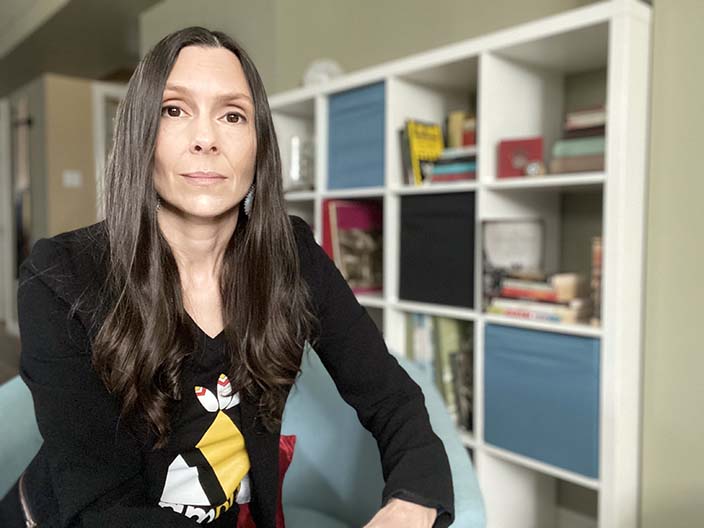Just about any conversation with Trina Roache will be chock full of laughs. It’s an important part of who she is, she says.
“I’m of Mi’kmaq and Irish ancestry with a great sense of humour. I laugh a lot, sometimes inappropriately,” Roache says with a wry chuckle.
When asked what she most wants people to know about her, she says it isn’t awards won or career highlights but her enthusiasm.
“I have a lot of energy and I just get really excited about stuff I want to convey. I want to bring that energy into the classroom and get others excited,” she says. “That’s who I am as a person.”
 Roache, now an assistant professor, is brand new to King’s School of Journalism as a faculty member. She holds the Rogers Chair in Journalism, but she’s been here before. She earned her Bachelor of Journalism from King’s in 2000.
Roache, now an assistant professor, is brand new to King’s School of Journalism as a faculty member. She holds the Rogers Chair in Journalism, but she’s been here before. She earned her Bachelor of Journalism from King’s in 2000.
“I have been doing journalism for years, mostly with APTN, and coming back to King’s means I get the chance to help shape how others do journalism. I see my role as the Rogers Chair as bringing a Mi’kmaw perspective and understanding to the basic practices of journalism.”
Roache plans to bring that to every class she teaches, from the intensive introductory courses that make up “bootcamp” to the video workshops. But she doesn’t want it to stop there and hopes other faculty members reach out.
“I don’t want the Indigenous curriculum to be siloed,” she says. “It needs to filter through.”
The cornerstone of her work is the course she will co-teach with Assistant Professor Terra Tailleur called Reporting in Mi’kma’ki. It is an immersive course that takes students out of the classroom (pandemic willing) and into Mi’kmaw communities.
“My goal is that someone who takes this course would be able to report from Mi’kma’ki—they will have an understanding of the real history of this country, they’ll understand that context, they’ll learn about the Treaties and how to engage with this community. They’ll learn about the protocols and how to report sensitively.”
Roache says the course is a two-way street.
“There is also something for the community in this process. The people will have a chance to share their stories, maybe take part in some workshops so that they are learning something about media coverage also. It’s about engaging and supporting the community. I want to encourage Mi’kmaw students who are deciding on a career to think about coming to King’s School of Journalism.”
Growing up in urban Halifax, Roache didn’t see her Mi’kmaw identity reflected. But her grandmother was a powerful influence, though the Mi’kmaw woman may not have known she was Roache’s inspiration to become a journalist.
“When my grandmother was a young woman, raising my dad and his brothers, there was a lot of racism against the Mi’kmaq, and Black communities as well. It was so prevalent. My grandmother spoke Mi’kmaq, she spoke it with her sister, but whenever anyone else came into the room she would stop. She quieted her voice. For me that has been a driving force—to give voice and to amplify the voices of people who have been quieted by things like residential schools and racism—all the injustice.”
It is something that she will be able to do at King’s through teaching and research. She can help influence a new generation of journalists to report with understanding and fairness and accuracy on a group of people who have been marginalized. A group she is part of.
Roache is a member of the Glooscap First Nation. She says her career with APTN allowed her to connect with and learn from Mi’kmaw communities all around Mi’kma’ki.
“As a journalist you are still on the outside, an observer to a degree. But it has allowed me an understanding. I am still on my journey. I am learning to speak Mikmaq. I want to bring this into King’s. People should know some of the phrases. You go to Germany; you know how to say hello and thanks. We’re in Mi’kmaki, I think we could do the same.”
Wela’lin, thank you.

